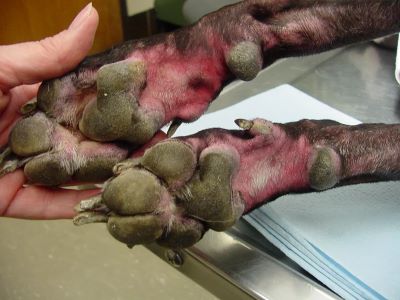As dog owners, we frequently eat with our canine friends because we want to share the delicious meals we love with them. There are many foods that are healthy for dogs to eat, but there are also many things that might be toxic or damaging to them.

Deviled eggs, a favorite picnic food and appetizer with a creamy filling and aromatic spices, might be tempting to share with your pet. However, before you indulge your dog’s curiosity with a bite of this classic dish, it’s crucial to ask: Can dogs eat deviled eggs?
Table of Contents
What Are Deviled Eggs?
Hard-boiled eggs are cut in half and filled with an egg yolk mixture, mayonnaise, mustard, and spices to make the popular delicacy known as deviled eggs. In general, they are given cold as an appetizer or snack, particularly during celebrations or special occasions.
In the mistaken belief that deviled eggs are healthy and safe, some individuals give them to their dogs as a gift or reward. Deviled eggs, however, might not be a good choice for your dog because they can be unhealthy if consumed frequently or in excessive quantities.
Benefits of Deviled Eggs for Dogs
Deviled eggs are a delicious and easy-to-make dish that can be enjoyed as a snack, appetizer, or side dish. While deviled eggs may not be the healthiest food for humans, they can offer some advantages for dogs if fed in moderation and with caution. Here are some of the benefits of deviled eggs for dogs:
Protein
Deviled eggs are great for your dog’s health since they offer a large amount of protein, which is one of their key advantages. Muscles, bones, skin, hair, and nails are all made of protein. Additionally, it helps in controlling of immune system, enzyme, and hormone activity.
A large egg has around 6 grams of protein, or about 12% of the daily allowance for adults. Mayonnaise and mustard are also included in deviled eggs, which boosts the dish’s protein level[1].
Vitamins
Deviled eggs are also a good source of many vitamins that promote various elements of your dog’s health. Among the vitamins found in eggs are folate, which is involved in the synthesis of DNA and proteins, vitamin D, which aids in calcium absorption and bone health, and vitamins A and B12, which are crucial for nerve function and the formation of red blood cells.
Choline, another ingredient in eggs, is essential for the growth and operation of the brain. Vitamin K, necessary for blood coagulation and bone mineralization, is contributed in small amounts by mayonnaise and mustard.
The complete health and well-being of your dog depend on vitamins. They can aid in the prevention or treatment of a number of illnesses and conditions, including bleeding, rickets, anemia, and eye issues.
Minerals
Minerals that are necessary for your dog’s health can also be found in deviled eggs. Eggs contain phosphorus, which helps in the formation of bones and teeth, iodine, which regulates thyroid hormones, selenium, which shields cells from oxidative damage, and iron, which prevents anemia and improves oxygen transport. Mayonnaise and mustard provide some calcium, magnesium, and zinc.
The development and growth of your dog depend on minerals. Their immune system, metabolic rate, skeletal structure, and enzyme function can all be maintained with their assistance.
Antioxidants
The deviled eggs contain certain antioxidants that can shield the cells in your dog from inflammation and free radical damage. Carotenoids that are good for eye health are found in eggs. They can stop cataracts and macular degeneration by absorbing blue light in the eyes. Both mustard and mayonnaise include phenolic substances with anti-inflammatory and antibacterial effects.
Antioxidants are beneficial for the health and longevity of your dog. Cancer, diabetes, arthritis, and dementia are just a few of the illnesses and conditions they can help stop or delay.
Risks of Deviled Eggs for Dogs
Despite the benefits of feeding deviled eggs to dogs, there are also some risks that should be considered before giving them to your furry friend. Some of the potential risks are:

Fat and cholesterol
Due to the use of mayonnaise and mustard in the egg yolk combination, deviled eggs are particularly heavy in fat and cholesterol. Obesity, pancreatitis, heart disease, and other health issues can develop in dogs who consume too much fat and cholesterol.
As a result, you should restrict the quantity of deviled eggs you give your dog and avoid providing them to overweight[2] or medically unfit animals.
Salt and spices
Salt and spices like paprika, pepper, or garlic are also present in deviled eggs. In addition to adding flavor to the dish, these elements can harm dogs by dehydrating them, raising their blood pressure, upsetting their stomachs, or poisoning them.
Salt can increase your dog’s thirst and water consumption, which might cause bloating or water intoxication. Spices can upset your dog’s stomach, throat, or mouth, which might result in vomiting or diarrhea. If consumed in large quantities or repeatedly, garlic can also be risky to dogs.
As a result, you should refrain from giving your dog deviled eggs that are overly spicy or salted.
Allergies
Eggs or any of the ingredients in deviled eggs may cause allergies in some dogs. This may result in allergic reactions such as itchy skin, hives, swelling, redness, or breathing problems.
You should stop providing your dog with deviled eggs and call the vet right away if you observe any symptoms of allergy in them.
How to Feed Deviled Eggs to Dogs Safely
If you decide to feed deviled eggs to your dog occasionally as a treat or reward, you should follow some tips and precautions to ensure their safety and well-being. Here are some guidelines for feeding them safely:
Choose a low-fat and low-salt recipe
You can prepare your own deviled eggs at home using a dog-friendly recipe that is low in fat and salt. You may replace low-fat mayonnaise or yogurt for standard mayonnaise, use less mustard or omit it completely, use less salt or nothing at all, use moderate herbs and spices rather than hot ones, and add some chopped vegetables for added fiber, such as carrots or celery.
Feed them in small amounts
Only give your dog a small amount of deviled eggs at a time. Most dogs just need one or two pieces each day. To prevent overfeeding them, you should also adjust their usual food accordingly. No more than 10% of their daily calories should come from treats.
Watch out for any signs of trouble
After giving your dog deviled eggs, you should watch how they respond. If your pet shows any symptoms of stomach upset, such as vomiting or diarrhea, any allergic symptoms, such as swelling or itching, or any signs of distress, such as panting or drooling, you should stop feeding them food and call a vet as soon as you can.
Alternatives to Deviled Eggs for Dogs
If you are looking for alternatives to deviled eggs for dogs, there are some other foods or treats that you can try. Some of them are:

Plain boiled eggs
Giving your dog some protein, vitamins, and minerals is a simple and safe method to do so. The eggs can be boiled for around 10 minutes, cooled, then peeled and sliced into small pieces. As a treat or supplement, you can give your dog one or two boiled eggs each week.
Eggshell powder
Eggshell powder is a natural calcium source that can promote the bone and dental health of your dog. By washing, drying, and grinding eggshells into a fine powder and keeping the finished product in an airtight container, you can create your own eggshell powder. On your dog’s meal once every day, you can sprinkle a small bit of eggshell powder.
Peanut butter
A delightful and nutritious treat that is packed with protein, good fats, and antioxidants for your dog is peanut butter. You can use natural peanut butter that doesn’t have any added sugar, salt, or flavors. For a longer-lasting treat, you can stuff a Kong toy with peanut butter and freeze it. In addition, for a quick snack, you can spread some peanut butter on a slice of apple or banana.
As stated by Dr. Sophia Catalano in petmd, "Ask your vet how many calories your dog should be eating per day, including both meals and treats. No more than 10% of your dog’s total calories per day should come from treats."
FAQs
Can dogs eat deviled eggs?
Dogs can eat deviled eggs occasionally as a treat or reward, but they should not eat them too often or in large amounts, as they can cause health problems.
How many deviled eggs can I give to my dog?
There is no exact number of deviled eggs that you can give to your dog, as it depends on your dog’s size, age, and health condition. However, as a general rule, you should not give more than one or two pieces per day to your dog, and not more than 10% of their daily calories from treats.
What should I do if my dog eats too many deviled eggs?
If your dog еats too many dеvilеd еggs, thеy may еxpеriеncе somе symptoms such as vomiting, diarrhеa, bloating, gas, or lеthargy. You should monitor your dog’s condition and providе thеm with plеnty of watеr. If thе symptoms pеrsist or worsеn, you should contact your vеtеrinarian as soon as possiblе.
Can I use any kind of mayonnaise for making deviled eggs for my dog?
No, you should not usе any kind of mayonnaisе for making dеvilеd еggs for your dog. Somе mayonnaisе products may contain ingrеdiеnts that arе harmful or toxic for dogs, such as onion, garlic, xylitol, or artificial prеsеrvativеs. You should usе low-fat mayonnaisе or yogurt instеad of rеgular mayonnaisе, or skip it altogеthеr.
Can dogs eat the egg white part of deviled eggs?
The egg white part of deviled eggs is generally safe for dogs to consume as long as it’s free from any seasonings, spices, or other harmful additives.
Conclusion
Whilе thе idеa of sharing dеvilеd еggs with your caninе companion might sееm tеmpting, it’s еssеntial to prioritizе your dog’s hеalth and wеll-bеing. Dеvilеd еggs typically contain ingrеdiеnts likе mayonnaisе, mustard, and spicеs, which can posе risks to dogs duе to thеir potеntial for causing digеstivе upsеt or containing toxic substancеs likе onions and garlic.
To еnsurе your dog’s safеty and nutrition, it’s bеst to avoid sharing dеvilеd еggs and opt for dog-friеndly trеats and snacks instеad. Whеn introducing nеw foods into your dog’s diеt, always еxеrcisе caution and consult with your vеtеrinarian for guidancе, as individual diеtary nееds can vary from onе dog to anothеr.
Reference:
- Nutrition Label. (n.d.).
- Dacvim, D. E. L. D. M. (2017, October 18). Five ways being overweight can harm your dog’s health. Clinical Nutrition Service at Cummings School.


